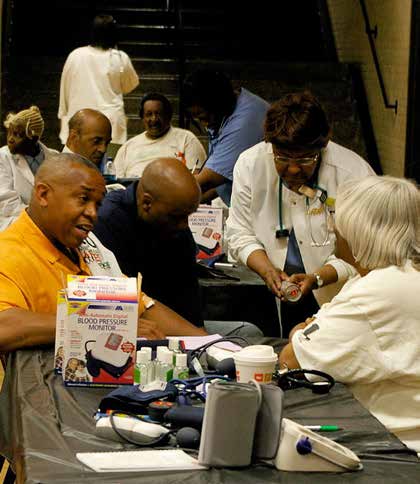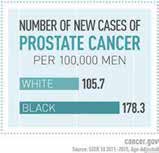Isaac Monroe was an officer and National Vice President for the Hotel and Restaurant Employees Union back in 2008 when he went to his primary care doctor at Northwestern Medical Center for a checkup and routine blood work. As he was leaving, the doctor told him that his prostate-specific antigen (PSA) was low – only 2.3. Below five is low. The doctor had also performed a digital rectal exam and informed Isaac that he was not enlarged. Isaac mentioned to the doctor that every now and then, he experienced an urgency to urinate – the “when you’ve got to go, you’ve got to go” kind.
“Well, your numbers are low, so I wouldn’t worry about it,” the doctor told him, assuring him they would look more closely when he came back the following year.
Isaac was not satisfied with that answer. So, he called an old classmate from Loyola University, Dr. Terry Mason, who is a top urologist in Chicago. Dr. Mason told Isaac to get a second opinion and referred him to a doctor with whom he used to work. The doctor, who was also at Northwestern, had a biopsy done, which indicated Isaac already had cancer.
Isaac went to the Total Health Institute in Carol Streams, Illinois, which practiced all-natural medicine. They recommended that he change his diet, putting him on an all plant-based diet. In less than two years later, they could not find any cancer.
Isaac stayed 100% vegan and about 80% raw food for a lot of years, but eventually started slipping back.
Seven years later, Isaac went for a routine physical at a free men’s health screening. His PSA was up to 17. They suggested he follow up and gave him a referral to Stroger’s Hospital. He was not able to get an appointment immediately, However, by the time he finally got an appointment at Stroger’s, he was dissatisfied with the doctor’s off-handed manner and walked out.
“Since I wasn’t having any pain or discomfort,” Isaac said, “I decided I would just wait and see.”
While waiting, he went to school at the Institute of Greater Nutrition and became a nutritionist and health coach. Having learned a lot about the body and prostate cancer, when the frequent urination returned, accompanied by constipation, he immediately contacted his primary care doctor. His doctor recommended he go to Walgreen’s and get some Dulcolax.
“You don’t understand, Doc,” Isaac countered, “I’ve been a vegan for a number of years. I don’t eat certain things and I don’t get constipated. I go regularly, four to five times a day. So, when I don’t go for three days, this isn’t regular constipation that calls for Dulcolax.”
From there, he went to the Proton Center at Northwestern. The Proton Center uses what is called Proton Therapy instead of standard x-rays used in conventional radiation therapy. They ran a full battery of tests and told him his PSA was up to 150. A few months later, he went to Northwestern Hospital and his PSA had risen to 272. “At that point,” he said, “they got my attention.”
They also saw spots on his bladder, colon, and lymph nodes.


Shortly thereafter, his cousin told him about the Cancer Treatment Center, promising him a whole new experience. His cousin was right. The Cancer Treatment Center kept him there for four days and there he said he experienced the best medical treatment he had ever had.
“In four days, I saw everybody in the medical profession,” he said, “every oncologist, every hematologist, you name it. And what I really liked, they were communicating with one another, because I would leave one to see another one, and by the time I got there, he had already looked at my records and had notes from the previous doctor.”
By that time, his PSA was up to 275, but the Cancer Treatment Center did not rush into a radical prostatectomy like most doctors were recommending; nor did they recommend actual chemotherapy. Instead, they gave him a chemo pill, plus an injection once a month to suppress his testosterone for maximum effectiveness. They also put him on Black Cohosh and Vitamin B6, both natural supplements.
At the same time, Isaac also went back to the Total Health Institute. They put him on a rigid plant-based diet, no sugar at all, no fruits, just all flaxseeds and smoothies – no bananas. They were also giving him intravenous Vitamin C. His PSA dropped 90 percent in one month.
Three months later, his PSA was down to 5.9, and as of this writing, it is down to 2.9. There were no longer spots present on his bladder, colon, or lymph nodes.
The Cancer Treatment Center said they would like to keep him on medication and keep treating him, even though the cancer was gone. Isaac explained that was the difference between conventional medicine and natural medicine. Conventional medicine wants to keep treating you, because they see a large percentage of people coming back.
However, what he learned from the Total Health Institute is it is not the organ, and it is not the disease; it is the environment that allows the disease to grow. The reason for the recurrence is because when people get well, they go back to eating the same foods and doing the same things they were doing before they got sick.


“During the course of all this,” he explained, “I’ve had friends who had prostate cancer and had their prostate removed. And years later they got cancer again in the same place. The doctor’s still calling it prostate cancer.”
The premise of the Total Health Institute is that all disease, pain, and discomfort begins with inflammation of some sort. The primary source of inflammation is stress. Next, it is diet, and third it is sleep patterns.
“So, if you get well, you get rid of all kinds of cancer, diabetes, whatever. If you heal and go back to the exact same lifestyle you’ve been living, there’s a good chance that the cancer’s going to show back up,” he says.
He adds, “So your whole body is designed to heal itself, given what it needs. You cut a finger, it heals. You break a bone, it heals. You give your body the proper nutrition, understand and control stress, and your body will heal.
Now, Isaac is totally committed to a plant-based, sugar-free diet, a stress-free lifestyle, and getting the requisite amount of sleep. This time, he knows the cancer is gone for good.
Louise Eberhart is a retired creative director from RJ Dale Advertising agency in Chicago. She is currently a free-lance writer.






